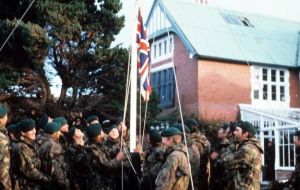MercoPress. South Atlantic News Agency
Falklands war, a turning point for Margaret Thatcher’s image and political fortunes
 Seventy four days after invasion day Argentine troops surrendered and the Union Jack is hoisted at the Governor’s residence
Seventy four days after invasion day Argentine troops surrendered and the Union Jack is hoisted at the Governor’s residence When the head of Argentina's military junta General Leopold Galtieri deployed military forces in the Falkland Islands, Britain assembled a task force to sail to the South Atlantic, to the astonishment of people in Britain, and the rest of the world.
The crisis became a defining moment of Margaret Thatcher's premiership, and changed her image and her political fortunes.
Until then, April 2, 1982, opinion polls showed her to be the most unpopular Prime Minister ever. After British forces won the Falklands war, her popularity soared, allowing her to call a general election in 1983 which she won by a landslide.
Mrs Thatcher established and chaired a small war cabinet, officially called the ODSA Overseas and Defence committee, South Atlantic, to take charge of the conduct of the war.
Within days of the invasion, the ODSA had authorised and dispatched a naval task force to retake the Islands.
Argentina surrendered after 74 days of occupation on June 14, ending a war which left 252 British, 3 Islanders and 649 Argentines dead. Half of the latter died after the British nuclear-powered submarine HMS Conqueror torpedoed and sank the Argentine cruiser General Belgrano on May 2 in the most controversial military action of the war.
Mrs Thatcher was criticised in parliament and, famously, on television by a member of the public for the decision to sink the Belgrano, which reports said was sailing away from the Malvinas at the time.
She maintained that the Argentine cruiser had posed a threat to British forces. Documents recently released show that the former PM was right and that the Belgrano was effectively prowling on the exclusion zone.
In the years after the conflict, Mrs Thatcher often referred in public and in private to the “Falklands spirit”, reflecting her nostalgia not only for her popularity at the time, but also her preference for the streamlined and efficient decision-making of the military and a small war cabinet rather than the drawn-out and often painstaking deal-making of cabinet government in peacetime.
In the Falklands she is revered as an immense figure, liberator of the Islands and a standing inspirer for the transformation of the forgotten South Atlantic islands into a dynamic, modern, self sufficient community with a brilliant future.




Top Comments
Disclaimer & comment rules-

-

-

Read all comments@5
Apr 08th, 2013 - 09:16 pm +1and not in Argentina???????????????????????????????????????
@5 Argentina will do anything but say sorry-we were wrong to invade-so now it is Britain's fault that Argentina chose aggression to break UN resolution 2065?
Apr 08th, 2013 - 09:47 pm +1Escalated the hostilties? Kicked out the invaders? Your point is?
Apr 08th, 2013 - 10:14 pm +1Commenting for this story is now closed.
If you have a Facebook account, become a fan and comment on our Facebook Page!